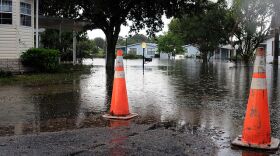The government shutdown that began Wednesday will cause a freeze in the Federal Emergency Management Agency's National Flood Insurance Program, and Florida will be hit hardest. The Sunshine State has 1.8 million policyholders — or 18% of all active NFIP policies nationwide — the most of any state.
Mark Friedlander, Senior Director of Media Relations at the Insurance Information Institute — a data-driven nonprofit that advises consumers and lawmakers — said that the NFIP will not renew or take in any new policies. He said this could affect an estimated 1,300 real estate closings per day that require flood insurance.
Although existing claims are not expected to be affected, with the program’s lapse in coverage, homeowners paying for flood damage coverage now through the NFIP might not be fully covered for new claims filed through to the remainder of the current storm season.
“FEMA’s borrowing authority from the U.S. Treasury would shrink from $30.4 billion to just $1 billion, drastically limiting its ability to pay new National Flood Insurance Program claims after a hurricane or another severe weather event,” Friedlander said. “As we are in the midst of peak Atlantic hurricane season and wildfire season, the shutdown could also delay implementation of essential disaster response resources and funding to impacted communities across the country.”
However, Lisa Miller, a former Florida Deputy Insurance Commissioner, Deputy Chief Financial Officer, and insurance expert and consultant, said that new homes or people left without coverage can always turn to the private insurance market – which has shown steady progress since the state implemented major insurance reforms in 2022.

Miller reminds people that property insurance and flood insurance are two separate policies.
“My motto is that if your driver's license says ‘Florida,’ you're going to flood — doesn't matter what zone you live in. It’s not a matter of if but of when,” she said. “Fortunately, there is a robust private flood insurance market that, in many cases, those policies are less expensive than the National Flood Insurance Program policies.”
Miller said Floridians have been through this before. During a shutdown in she said it was tough, but Floida’s homes and insurers managed to work things out.
“It was pretty severe, but sometimes, usually at the last minute, they come up with a deal and it works. But this one looks like it may be for a while,” she said. “We hope it doesn't last a long time.”
Miller said one of the best ways homeowners can learn about their flood insurance options is to talk to their current property insurance agent or visit the Florida Office of Insurance Regulation’s website to find out more.
Lillian Hernández Caraballo is a Report For America corps member.








